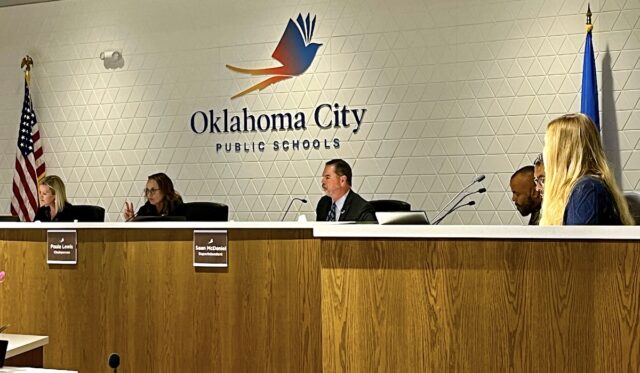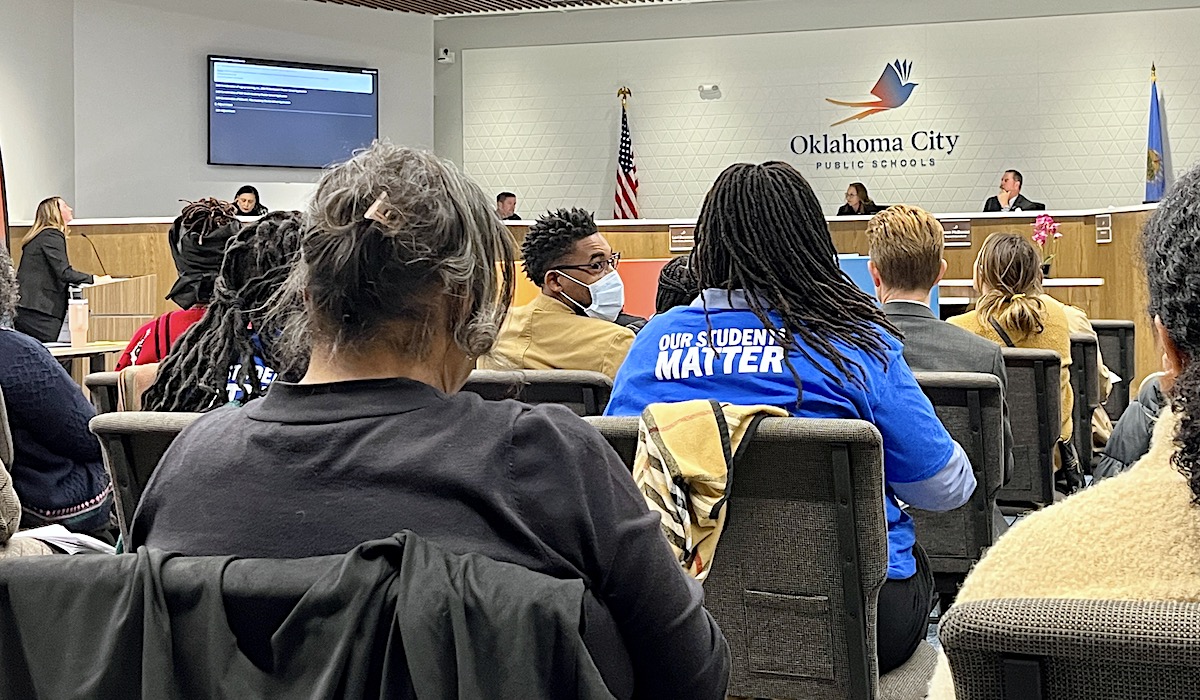
As three of four potential new charter schools seeking authorization from Oklahoma City Public Schools revise their applications, district documents show the one school approved by the board in November tied for the lowest score among applicants.
Schools proposed under the names Oklahoma Montessori Initiative, P3 Urban Montessori, RISE STEAM Academy and Willard C. Pitts Academy all submitted applications to the board Sept. 1. After an OKCPS staff committee reviewed the applications, Superintendent Sean McDaniel recommended Nov. 27 that board members deny each proposal and ask for revisions within 30 days, a common part of the charter application process.
But during a chaotic series of votes that included numerous questions from board members about OKCPS’ entire charter school application process, the two highest-scoring applications were rejected and a school that received just under 55 percent of possible points in the district’s analysis — the Oklahoma Montessori Initiative — was approved after three separate votes.
According to the review committee scoring rubric, each application could have earned 84 total points from the OKCPS committee, and each was graded on three main areas: educational program design, operations and finance. The OKCPS charter applications were scored from zero to four point on 21 criteria, and results can be reviewed here.
Proposed to serve an area of northwest Oklahoma City that includes Nichols Hills, The Village, Quail Creek, Chisholm Creek and North Highland, the Oklahoma Montessori Initiative was approved despite receiving a score of zero for “facilities” and scores of one in the categories of “finance,” “transportation” and “child nutrition services.”
The approved school’s application received 46 total points, tying it with P3 Urban Montessori School for the lowest analysis among the four applicants.
By comparison, the RISE STEAM Academy and Willard C. Pitts Academy received 61 and 63 points, respectively. Both were denied, along with the P3 Urban Montessori School application. Each of those proposed schools would serve portions of northeast Oklahoma City, a historically Black part of town.
“It doesn’t always happen like this,” OKCPS Board Chairwoman Paula Lewis said Nov. 27 as member moved between votes and asked questions about the process. “This is an interesting jostling of things.”
Under state law, the three charter school applicants initially rejected have 30 days to revise their documentation and resubmit for further consideration. After that Dec. 27 resubmission deadline, the district’s committee will rescore applications, and the OKCPS board will have another 30 days before it must give final approval or denial.
After an OKCPS board meeting Dec. 4 — which could be the district’s final meeting of the year — McDaniel said it would be up to board members whether “to have representatives from each of the applications to come in and present to them.”
“So [the board members] would have the application, you would have the rubric from the committee, and if they want that next layer of, ‘We want to hear directly from representatives,’ then they can do that as well,” McDaniel said.
Charter schools are public schools that operate with their own governing board and additional flexibility on certain requirements. If local school districts reject a proposal, its backers may apply to other entities for authorization, such as higher education institutions, the State Board of Education and sovereign tribal nations.
OKCPS concerned with applicant finances, facilities
Led by charter school coordinator Jason Mack, the OKCPS review committee gave each of the four applications a score of two or lower for their finance sections. Both RISE STEAM Academy and Willard C. Pitts Academy — initially rejected Nov. 27 — received twos for their finance scores. The approved Oklahoma Montessori Initiative received a one, while the initially rejected P3 Urban Montessori received a zero. Similarly, all four schools received either a one or a zero for their facilities sections, but board members noted that they believed some of the schools would be able to provide additional information about potential lease agreements when they resubmit.
For each application, the OKCPS review committee noted that each application while each proposed school expected to receive startup funds from the Walton Family Foundation, reviewers said they did not consider that funding to have been secured. Each school also seemed to budget much less for insurance than what the review committee felt would be necessary.
Reviewers also seemed concerned that the P3 Urban Montessori application had not budgeted for facility cost or salary increases within its first five years.
For the Oklahoma Montessori Initiative, reviewers seemed concerned that the applicants had not properly budgeted for all types of teacher salaries.
The Oklahoma Montessori Initiative also received a zero for the facilities section of its application, in which applicants indicated the school will likely need a building of at least 44,000 square feet. The applicants wrote that although they had not yet secured space, all of the options they were considering were larger than 44,000 square feet.
Still, reviewers seemed concerned with the challenge of finding that much space in the school’s proposed operation area, which primarily spans higher-income areas of northwest Oklahoma City.
The OMI application also received scores of one for the new school’s lack of intention to provide student transportation and its lack of details within a nutrition plan.
Scoring higher on the building component than the approved OMI application, the initially rejected P3 Urban Montessori proposal received a one for its facilities section. Reviewers mentioned that while two possible locations had been identified, applicants failed to provide sufficient details on their plan to secure a location.
RISE STEAM Academy similarly received a one for its facilities section, with the review committee noting that some of its identified options seemed unsuitable and that the proposed timeline for securing a facility seemed “unrealistic.”
Willard C. Pitts Academy also received a one for its facility section. The scoring rubric claimed the application did not account for separate spaces for students who might need extra support. Additionally, the review committee seemed concerned about the condition of a proposed site for the school, OKCPS’ former Polk Elementary School just north of Northeast 36th Street and Prospect Avenue. In recent years, the building has been home to Boys & Girls Club and Restore OKC operations.
Applicant: Denial ‘made me work a little bit harder’

Community members who attended the Nov. 27 OKCPS board meeting were predominantly Black, and the board’s decision to approve the only school not proposed for northeast OKC caught the attention of some in the audience.
Weeks later, however, the other applicants said they were not frustrated by the board’s decision to send their applications back for revisions, despite the revelation that they scored the same or more points than the lone application approved in November.
Latasha Timberlake, who is leading the effort to create the Willard C. Pitts Academy, said she is excited to resubmit her present her vision to the board.
“I’m just looking forward to the next phase in the process, and (I’m) just eager to actually have an opportunity to tell my story and voice why I am venturing to open Willard C. Pitts Academy Charter School in northeast Oklahoma City,” Timberlake said.
Although Timberlake said she felt there could have been better communication throughout the first phase of the OKCPS charter application process, she said the approval of an application that scored lower than hers was not frustrating.
“That’s why we have processes in place. And according to the process, (…) the review committee gets an opportunity to review the application and decide whether they recommend for approval or not, [and then] it goes to the the board itself and they get to recommend for approval or not,” Timberlake said. “You don’t necessarily have to have approval from the review committee. It can come directly from the school board.”
Carma Barlow, who is leading the effort to create the RISE STEAM Academy, echoed Timberlake’s comments when asked about the lowest-scoring application being the only one approved so far.
“I think it just highlights there is the review committee and then there’s the board, and the process is really trying to satisfy both of those entities and make sure that everybody has a clear understanding about the school,” Barlow said.
Barlow said she submitted her revised application Friday.
“I feel pretty good about the next phase of the process, I think,” Barlow said. “I’ve answered all of the feedback and all of the questions and concerns that were given to me in the executive summary — the scoring documents. So I hope that I have satisfied the review committee’s concerns about the school in my resubmission.”
Both women also said they were particularly excited to address board members directly when the OKCPS governing body next considers their applications. However, as McDaniel noted, there is no guarantee that those making OKCPS charter applications will provided an opportunity to answer questions about their proposals.
“I hope that that happens,” Barlow said. “I think that’s where some things got lost. Without the ability to have that interaction with the board or even the review committee and just explaining rationale and being able to answer questions — I think without that opportunity, it just made it more difficult for everyone to have a real clear understanding about RISE and what we’re trying to do.”
After watching the Nov. 27 OKCPS board meeting, Timberlake said she felt there was distance between the board and the review committee that could be closed if applicants were able to answer board members’ questions during a meeting.
“It just seems as if there were a lot of things that are not in alignment (with the application process),” Timberlake said. “I feel like there were some things that were being asked (…) at the board meeting, but looking at the information that I received from the scores from the (review) committee, maybe there was some disconnect in terms of that being articulated to the board or the board not really being able to review the information whole-heartedly.”
Reached by phone Friday, Rosalyn Robinson said she planned to resubmit her application to create the P3 Urban Montessori school. She said she was not frustrated that a charter school application that received the same score as hers was approved while her application was denied.
“It just gave me an opportunity to make it even cleaner, because I’m going to need that application in the future for other things,” Robinson said. “So they kind of did me a favor — made me work a little bit harder.”
Robinson also said it “would be great” if she received the chance to address OKCPS board members when they next considered her application.
After the Nov. 27 board meeting, members Mark Mann and Lori Bowman said they were open to hearing from the OKCPS charter school applicants. Bowman and Mann both ultimately voted in favor of the approved OMI application.
Rufus Howard, who lead the effort to get the Oklahoma Montessori Initiative authorized by the board, said Friday that although his application had bee approved, he was still working on submitting an addendum that would address the review committee’s feedback.
“When we submitted our application, we were just following the process. How they were scored was totally out of our control,” Howard said. “Our model, I believe, set us apart. And consider the fact that Oklahoma City Public Schools wants innovation — I believe that our Montessori model will bring that. And so I’m just appreciative and happy that we are given that opportunity to bring Montessori to Oklahoma City.”
During the Nov. 27 meeting, board members voted three times on the Oklahoma Montessori Initiative application. The first two votes were on motions to accept the district’s recommendation denying the applications. The first vote failed with board members split 4-4. On the second vote to accept the recommendation to deny the application, Bowman switched her vote and voted against the motion, so it failed 3-5. The third vote involving the school was on a motion to approve the application. It passed 6-2, with Mann joining the five others who had already voted in support of the proposed school.
OKCPS board president Paula Lewis did not respond to a request for comment prior to publication of this article. Bowman acknowledged the questions posed to her. Board member Meg McElhaney, who voted in favor of the two Montessori school proposals but against RISE STEAM Academy and Willard C. Pitts Academy, answered a phone call Friday but said she was unavailable to answer questions at the time.
New charter elementary school opening in fall 2024
The Oklahoma Montessori Initiative is not the only new charter school preparing to open in Oklahoma City.
Harding Independence Charter District, which is home to Harding Charter Preparatory High School and Independence Charter Middle School, announced Dec. 12 that it is opening Harding Charter Preparatory Elementary School for the fall 2024 semester. The schools of the charter school district have been authorized by OKCPS for two decades.
The new elementary school school will be located at 12600 N. Kelley Ave. in Oklahoma City near HCP’s current high school, and it will have current John Rex Charter Elementary School principal Lana Ingram as its founding principal.
“As a district, we believe in establishing a PK-12 grade college preparatory environment through a rigorous teaching and learning model with comprehensive student support while intentionally involving our community in the educational process,” Superintendent Steven Stefanick said in a press release. “Through Lana’s outstanding leadership and elementary experience, we are confident that this new school option will provide more quality educational seats to Oklahoma City families.”
(Editor’s note: The Sustainable Journalism Foundation has received grant funding from the Walton Family Foundation to support coverage of education issues in Oklahoma.)





















